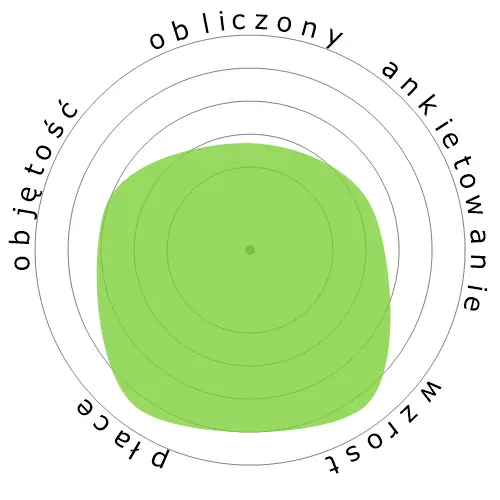Analitycy Bezpieczeństwa Informacji




Ludzie również oglądali
Obliczone ryzyko automatyzacji
Umiarkowane ryzyko (41-60%): Zawody z umiarkowanym ryzykiem automatyzacji zwykle obejmują rutynowe zadania, ale nadal wymagają pewnego ludzkiego osądu i interakcji.
Więcej informacji na temat tego, czym jest ten wynik i jak jest obliczany, jest dostępne tutaj.
Ankieta użytkownika
Nasi goście głosowali, że nie są pewni, czy to zawód zostanie zautomatyzowany. To ocena jest dodatkowo wspierana przez obliczony poziom ryzyka automatyzacji, który szacuje 58% szansę na automatyzację.
Jakie są Twoje zdanie na temat ryzyka automatyzacji?
Jakie jest prawdopodobieństwo, że Analitycy Bezpieczeństwa Informacji zostanie zastąpione przez roboty lub sztuczną inteligencję w ciągu najbliższych 20 lat?
Nastroje
Poniższy wykres jest zamieszczany wszędzie tam, gdzie istnieje znaczna liczba głosów, aby przedstawić istotne dane. Te wizualne reprezentacje pokazują wyniki ankiet użytkowników w czasie, dostarczając istotnych wskazówek dotyczących trendów nastrojów.
Nastroje w czasie (rocznie)
Wzrost
Liczba ofert pracy na stanowisku 'Information Security Analysts' ma wzrosnąć 32,7% do 2033
Całkowite zatrudnienie oraz szacowane oferty pracy
Zaktualizowane prognozy mają być dostępne 09-2025.
Płace
W 2023, mediana rocznej pensji dla 'Information Security Analysts' wynosiła 120 360 $, czyli 57 $ za godzinę.
'Information Security Analysts' otrzymali wynagrodzenie wyższe o 150,4% od średniej krajowej, która wynosiła 48 060 $
Płace z biegiem czasu
Objętość
Od 2023 roku zatrudnionych było 175 350 osób na stanowisku 'Information Security Analysts' w Stanach Zjednoczonych.
To oznacza około 0,12% zatrudnionej siły roboczej w całym kraju.
Inaczej mówiąc, około 1 na 866 osób jest zatrudnionych jako 'Information Security Analysts'.
Opis stanowiska pracy
Planuj, wdrażaj, aktualizuj lub monitoruj środki bezpieczeństwa dla ochrony sieci komputerowych i informacji. Oceniaj podatności systemu na zagrożenia bezpieczeństwa i proponuj oraz wdrażaj strategie łagodzenia ryzyka. Może zapewnić, że odpowiednie kontrole bezpieczeństwa są na miejscu, które będą chronić cyfrowe pliki i kluczową infrastrukturę elektroniczną. Może reagować na naruszenia bezpieczeństwa komputera i wirusy.
SOC Code: 15-1212.00


Komentarze
Leave a comment
It'll be a race between red and blue team businesses to implement increasingly better models. Social engineering sure, but meh honestly. Will you be able to find incredibly difficult scraps or oversights the model missed? Will it be worth the risk and investment of the pentester? Overall bleak outlook.
This will increase the ability of automated systems to detect any remaining vulnerabilities, but will not completely remove the need for technicians to maintain, remediate, and upgrade the systems. There will still be a need to touch the hardware. Depending on individual situation, some companies will use more of AI tech than the others. We can already see something similar in the engineering, accounting, and law practice, where paralegals and drafters have not been completely replaced by software. Sole practitioners might use automation more extensively than the large corporations, but there will be a legal requirement for a human audit.
In addition, location-independent digital nomads who train themselves to use the automation tools could do a lot of accurate work in a short amount of time, as independent consultants and freelancers, and do business with multiple clients.
Making the choice to transition from repetitive and tedious manual work to automation, will be akin to transitioning from flintstones to nuclear power. Nuclear power still needs humans, and so will information security solutions.
Zostaw odpowiedź na temat tego zawodu